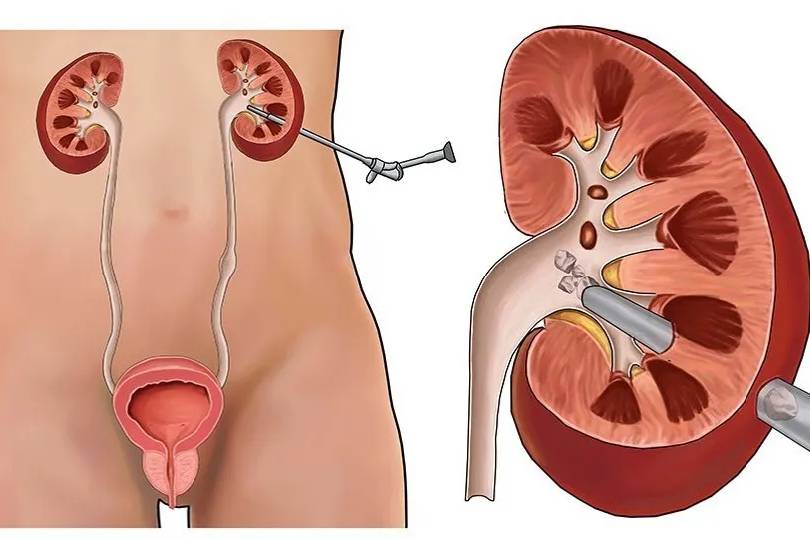PCNL Surgery for Kidney Stone Removal

PCNL Surgery for Kidney Stone Removal
Percutaneous Nephrolithotomy (PCNL) is an advanced and minimally invasive surgical procedure used to remove large kidney stones that cannot pass naturally or be treated with other non-invasive methods. PCNL is highly effective in treating complex kidney stones, offering quicker recovery and better outcomes.
Dr. Uday Chandankhede, a leading PCNL Surgery for Kidney Stone Removal in Pune, specializes in performing this procedure with precision, ensuring patient safety and successful stone removal.
When is PCNL Surgery Recommended?
PCNL is typically advised for patients with:
- Large kidney stones (>2cm) that cannot pass through urine.
- Staghorn calculi, which are branched stones filling the kidney.
- Multiple kidney stones that are resistant to other treatments.
- Obstructive kidney stones causing severe pain, infections, or kidney damage.
- Failed previous treatments such as shock wave lithotripsy or ureteroscopy.
Symptoms Indicating the Need for PCNL Surgery
- Severe lower back or flank pain
- Blood in urine (hematuria)
- Recurrent urinary tract infections (UTIs)
- Frequent urination or difficulty urinating
- Nausea and vomiting associated with kidney stone complications
The PCNL Surgery Procedure
Dr. Uday Chandankhede follows a systematic approach to ensure safe and effective PCNL surgery:
1. Preoperative Evaluation
- Detailed medical history assessment and blood tests.
- Imaging tests such as CT scan, X-ray, or ultrasound to locate stones.
- Urine analysis to detect infections or abnormalities.
2. Procedure Steps
- Anesthesia: General or regional anesthesia is administered.
- Small Incision: A tiny incision (about 1cm) is made in the back.
- Nephroscope Insertion: A thin tube with a camera is passed into the kidney.
- Stone Fragmentation: Laser or ultrasonic energy is used to break the stone.
- Stone Removal: Extracted using suction or forceps.
- Drainage Tube Placement: A nephrostomy tube may be left temporarily to drain fluids.
3. Postoperative Care
- Hospital Stay: Usually 1-2 days for monitoring.
- Pain Management: Medications provided for comfort.
- Hydration & Diet: Patients are advised to drink plenty of fluids.
- Follow-up Appointments: Regular check-ups to ensure recovery and prevent recurrence.
Benefits of PCNL Surgery
- Minimally Invasive: Small incision leading to reduced pain and quicker recovery.
- High Success Rate: Effective in removing large and complex stones.
- Shorter Hospital Stay: Most patients are discharged within 1-2 days.
- Less Trauma to Kidney: Preserves kidney function with minimal damage.
- Faster Recovery: Patients can resume normal activities within a few weeks.
Risks and Complications of PCNL Surgery
While PCNL is generally safe, some potential risks include:
- Mild bleeding (managed with proper care)
- Temporary urinary infections (treated with antibiotics)
- Rare risk of kidney or adjacent organ injury (minimized with expert surgical skills)
Recovery and Post-Surgery Guidelines
- Drink at least 2-3 liters of water daily to prevent stone recurrence.
- Avoid excess salt, oxalate-rich foods, and high protein intake.
- Mild physical activity can be resumed after a week.
- Regular follow-up tests to check kidney function and prevent future stones.
Why Choose Dr. Uday Chandankhede for PCNL Surgery in Pune?
- Experienced Urologist: Highly skilled in performing PCNL with successful outcomes.
- Advanced Surgical Techniques: Use of modern equipment for precision.
- Comprehensive Patient Care: From diagnosis to post-operative recovery.
- State-of-the-Art Facility: Equipped with the latest technology for safe and effective treatment.
Conclusion
Kidney stones can cause significant discomfort and complications if left untreated. Dr. Uday Chandankhede, the leading expert in PCNL Surgery for Kidney Stone Removal in Pune, provides safe, effective, and minimally invasive solutions for complex kidney stones. If you are suffering from persistent kidney stones, consult Dr. Chandankhede for expert advice and advanced treatment options.
Our Services
About Dr. Uday Chandankhede
Dr. Uday Chandankhede is a highly skilled Uro-Oncologist and Robotic Surgeon with extensive experience in diagnosing and treating urological cancers. Proficient in laparoscopy and minimally invasive robotic surgeries, he is dedicated to advancing patient care in the field of uro-oncology through innovation, research, and precision-based surgical techniques.
Currently serving as a Consultant Uro-Oncologist and Robotic Surgeon at Urokul Hospital, Baner, Pune, Dr. Chandankhede has previously worked at Wockhardt Hospital, Nagpur, where he played a vital role in managing complex urological cancer cases. His expertise includes a wide range of procedures, including open, endoscopic, and robotic-assisted surgeries, making him a leader in modern urological treatments.
With a strong academic foundation, Dr. Chandankhede holds an MBBS degree from JNMC, Wardha, an MS in General Surgery from NSCB MCH, Jabalpur, and a DNB in Urology from NBE, Delhi. Further specializing in Uro-Oncology, he completed a fellowship at Tata Memorial Hospital, Mumbai, enhancing his skills in cancer management and robotic-assisted procedures.
In addition to his clinical work, Dr. Chandankhede is actively involved in research, with numerous publications in renowned medical journals. His contributions to uro-oncological advancements include studies on prognostic factors in bladder cancer, the impact of COVID-19 on cancer surgeries, and novel techniques in prostate and kidney cancer treatment.
Committed to continuous learning and professional development, Dr. Chandankhede has attended and presented at various national and international conferences, sharing his expertise on uro-oncology, robotic surgery, and andrology. He also participates in faculty-led workshops, training the next generation of surgeons in advanced surgical techniques.
At Urokul Hospital, Baner, Pune, Dr. Chandankhede remains dedicated to providing comprehensive, patient-centric care, ensuring the best possible outcomes for individuals battling urological cancers. His passion for innovation, surgical excellence, and compassionate care makes him a trusted name in the field of uro-oncology and robotic surgery.
